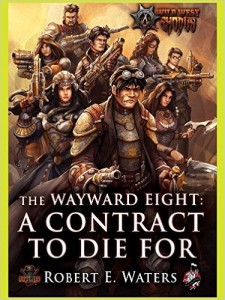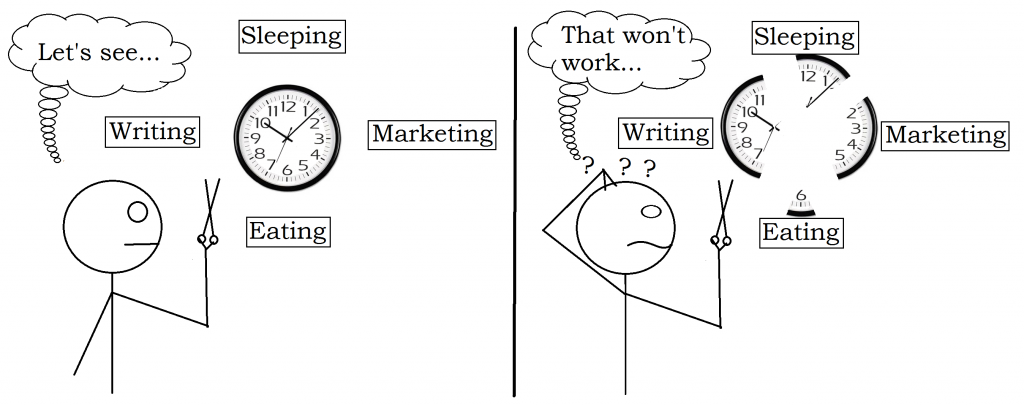Another fellow author from the Hides the Dark Tower anthology has consented to an interview. It’s interesting how that anthology gathered so many incredible writers together. Today, please welcome Robert E. Waters.
 Robert E. Waters is a science fiction and fantasy writer. Since 1994, he has worked in the computer and board gaming industry as technical writer, editor, designer, and producer. His first professional fiction publication came in 2003 with the story “The Assassin’s Retirement Party,” Weird Tales, Issue #332. Since then he has sold stories to Nth Degree, Nth Zine, Black Library Publishing (Games Workshop), Dark Quest Books, Padwolf Publishing, Mundania Press, and Rogue Blades Entertainment. Between the years of 1998 – 2006, he also served as an assistant editor to Weird Tales, and is still a frequent contributor to Tangent Online, a short fiction review site. Robert currently lives in Baltimore, Maryland, with his wife Beth, their son Jason, and their cat Buzz.
Robert E. Waters is a science fiction and fantasy writer. Since 1994, he has worked in the computer and board gaming industry as technical writer, editor, designer, and producer. His first professional fiction publication came in 2003 with the story “The Assassin’s Retirement Party,” Weird Tales, Issue #332. Since then he has sold stories to Nth Degree, Nth Zine, Black Library Publishing (Games Workshop), Dark Quest Books, Padwolf Publishing, Mundania Press, and Rogue Blades Entertainment. Between the years of 1998 – 2006, he also served as an assistant editor to Weird Tales, and is still a frequent contributor to Tangent Online, a short fiction review site. Robert currently lives in Baltimore, Maryland, with his wife Beth, their son Jason, and their cat Buzz.
And now, the interview:
Poseidon’s Scribe: How did you get started writing? What prompted you?
Robert E. Waters: At a very early age, I was interested in story. My grandfather used to tell me stories he made up on the fly. One of my favorites were his “Quirrel the Squirrel” stories, and I’ve considered putting them down on paper and getting an artist to draw them. Perhaps someday I will. I was also into horror movies when I was a kid, and even though I’d have terrible nightmares after seeing the movies, I kept coming back to them. So I’ve always had this thing about story, about strange, fantastic stories in particular. And that early interest eventually led to me to writing my own stories by the time I was twelve.
P.S.: Who are some of your influences? What are a few of your favorite books?
R.E.W.: My early influences were Robert Sheckley, Clifford Simak, and Robert Silverberg, just to name a few. Specifically, science fiction authors (or those authors more commonly associated with SF) have had the biggest influence on my writing, although I must say that the first time I read JRR Tolkien, I was paralyzed with awe. The years, unfortunately, have not been as kind to me when it comes to Tolkien’s staying power. Don’t get me wrong: He’s a terrific author, but his writing style, his manner of dialog, his pacing, etc. have not had the long-term effect on my own work that other writers have had. And some of my favorite books are not SF/Fantasy at all. My favorite novel ever is TC Boyle’s Water Music. It’s in my opinion, a tour de force of stylistic prose genius. It literally took me six months to read anything else afterwards because everything I read thereafter just could not compare. Other novels in the SF/Fantasy genre that I have always considered my favorites include Orson Scott Cards Ender’s Game, Sheckley’s Dimensions of Miracles, Walter John Williams’ Metropolitan, and of course George RR Martin’s Song of Ice and Fire series. Oh, and let’s throw in Glen Cook’s Black Company series for good measure. His and Martin’s fantasy are the kind I like the most; grittier and more realistic.
P.S.: What are the easiest, and the most difficult, aspects of writing for you?
R.E.W.: The easiest part for me is getting into the emotions and personal interactions of the characters. Once I have a good idea of who a character is, how he/she needs to react, their background, their personal relationships with other characters, etc. I can put them into pretty compelling situations. The hardest for me is keeping my prose tight. I have a tendency to meander into backstory. I seize on a nugget of a character’s backstory that I particularly like and want to share it with the audience, even though it has no relevance whatsoever with the story at hand. So I have to be mindful of how much superfluous flummery I am putting into a story.
P.S.: How would you describe the genre or style of the stories you write? Any common themes?
R.E.W.: Well, my genre is almost always science fiction and/or fantasy. It’s funny, but I find that I can write fantasy better than SF, even though I prefer SF when it comes to reading. And no, I really don’t have many common themes, although I do love the character who prevails in the face of insurmountable odds. I like a flawed character, not one who has the right answer for every situation, says the right things every time. I like characters that have to fight to achieve their glory, and I don’t mind a character stumbling into victory, so long as it’s an honest stumble.
P.S.: What sets your stories apart from those of other authors who write in your genre(s)?
R.E.W.: This is a tough question and one that I’ve never given much thought to. But I like to think that my stories bring some real humanity to my characters. I try to create believable characters for my stories, people that the reader can relate to in some way or another. A lot of authors do this, certainly, but oftentimes characters in SF are defined more by the gadgets they carry and not the content of their hearts. George RR Martin is often fond of quoting William Faulkner’s Nobel Prize speech: The only thing worth writing about is the human heart in conflict with itself. There’s a lot of truth to that in writing fiction.
P.S.: You spent several years as an assistant editor of the renowned magazine Weird Tales. How did that editorial experience affect your writing?
R.E.W.: My experience at Weird Tales was a huge factor in my writing. One of my jobs there was reading the slush pile. Stacks of stories would be put in front of me and I’d have to read them all and decide if they were good enough to be pushed up the editorial line, or should they be rejected. Doing this over and over helps in a couple important ways: First, you see errors in the stories that you are doing in your own writing, and second, it humbly reminds you that you are one in hundreds of people trying to get published. I came out of that experience ten times a better writer then when I went in, and I highly recommend to anyone who gets the opportunity to read slush to do it, even if you don’t get paid.
P.S.: You wrote “The People’s Avenger” for ![Pageflex Persona [document: PRS0000039_00001]](https://stevenrsouthard.com/wp-content/uploads/2015/10/HidesTheDarkTower-DigitalCover-FINAL2-200x300.jpg) Hides the Dark Tower. Can you tell us the backstory for this tale?
Hides the Dark Tower. Can you tell us the backstory for this tale?
R.E.W.: The main character in “The People’s Avenger” is Nalo Thoran, a hired assassin who works the streets of Korsham City. A thief by the name of Falco Creed has come to Korsham to find and steal back an ancient artifact that holds cultural significance to his people. The artifact had become a spoil of war taken by the Korsham army in battle against the Brenian’s of the south. The story revolves around their cat-and-mouse chase through the dark, dank streets of Korsham, as Nalo tries to kill the thief, and Falco tries to stay alive.
P.S.: That’s not your only story featuring the character Nalo Thoran. You’ve written several others. Please describe him. Do you intend to combine those stories in a series?
R.E.W.: Nalo Thoran was once a simple urban boy living in the streets of Korsham City. During one of Korsham’s wars against the southern kingdom of Brenia, he was pressed into the army and forced to serve as an assistant to a quartermaster. On a quiet, foggy morning in the midst of this war, he was lured to a waterfall by a beautiful singing voice. There he met Tish, the Mistress of Kalloshin, The Seething Dark Eternalness, the Paton Saint of Assassins, who bathed with him and stole his soul. Nalo was immediately transported to the assassin’s guild in Korsham, where he has served and killed for Kalloshin for decades. But he’s not a happy warrior in this secret war. He serves his master’s purposes, but he hates every minute of it, dreaming of a time when he can be free to live his own life, or to die. Either end game is acceptable to him.
To date, I have published five Nalo Thoran stories. I have a couple more scheduled for publication in the next year, and someday I hope to combine them all in a series, or as a collection.
 P.S.: You’ve just had your first novel published, The Wayward Eight: A Contract to Die For. Can you tell us about it briefly? Do you think you’ll write more novels, or go back to short stories?
P.S.: You’ve just had your first novel published, The Wayward Eight: A Contract to Die For. Can you tell us about it briefly? Do you think you’ll write more novels, or go back to short stories?
R.E.W.: The Wayward Eight is a weird wild west novel set in the miniatures game universe Wild West Exodus. The story revolves around a mercenary unit known as the Wayward Eight, led by ex-Confederate officer Captain Markus Wayward. He and his gang of killers have been hired by the Union to find and assassinate the known mad scientist Doctor Carpathian, who has come to America from Europe to create and lead an undead army to crush the Union and all others that may stand in his way. But there are other mercenaries on the hunt for Carpathian as well, and Markus Wayward and his crew find the way fraught with difficulty.
And yes, I do plan to write other novels. There are plans for at least one more novel set in the Wild West Exodus universe, and two other novels which I cannot provide many details about as of yet. But I also plan to work on short stories as well as the opportunities arise. I get invites to anthologies from time to time and I am a frequent contributor to Eric Flint’s online magazine, The Grantville Gazette, which publishes stories set in his 1632/Ring of Fire alternate history series. I’m keeping busy.
P.S.: What is your current work in progress? Would you mind telling us a little about it?
R.E.W.: I recently finished a short story set in my Devil Dancers military SF series. The Devil Dancers are Apache fighter pilots engaged in an alien war with the Gulo, a wolverine-like race that threatens to conquer all of human space. I have published three stories so far in the series, with three more pending publication. In these stories I explore Native American culture and spiritualism, and try to address issues of both peace and war, and what is the price to preserve and wage both. My latest story is “The First Peace,” which is a title inspired by a bit of philosophy from Black Elk: “The first peace, which is the most important, is that which comes within the souls of people when they realize their relationship, their oneness with the universe and all its powers, and when they realize at the center of the universe dwells the Great Spirit, and that its center is really everywhere, it is within each of us.”
Poseidon’s Scribe: What advice can you offer aspiring writers?
Robert E. Waters: Robert A Heinlein’s advice is still relevant today. To be a professional writer you must: Write, you must finish what you write, and you must put on the market your finished stories. Good advice then, good advice today. Another thing I’d recommend is to study history and science. It’s amazing how many ideas you can come up with by reading accounts of historical events. I recently wrote a story called “Mungo Snead’s Last Stand” which is another weird wild west story that will be in the Weird Wild West Anthology from e-Spec Books later this year, and the events in that story were inspired by my reading of the Rorke’s Drift battle of the Zulu Wars. The inspiration behind my Devil Dancers stories is my love of Native American culture and years of study in that field. I find it incredibly hard to just sit down and write. I need an idea solidly in my head before I type the first sentence. So, read history, read science, read about other cultures, and then imagine twists to apply to those events that will give you story ideas.
Thanks, Robert! My readers can find out even more about author Robert E. Waters at his website.
Poseidon’s Scribe
 Well, you’d better make time for it. Somehow. Sure, you want to spend your precious time writing and you don’t like marketing. That’s why you became a writer. Still, it turns out that your preferences don’t really enter into this—you must do most of your own marketing (or pay someone to do it for you).
Well, you’d better make time for it. Somehow. Sure, you want to spend your precious time writing and you don’t like marketing. That’s why you became a writer. Still, it turns out that your preferences don’t really enter into this—you must do most of your own marketing (or pay someone to do it for you).
 You might have rejected the idea of switching genres already. I can hear your reasons now:
You might have rejected the idea of switching genres already. I can hear your reasons now:
![Pageflex Persona [document: PRS0000039_00001]](https://stevenrsouthard.com/wp-content/uploads/2015/10/HidesTheDarkTower-DigitalCover-FINAL2-200x300.jpg)
